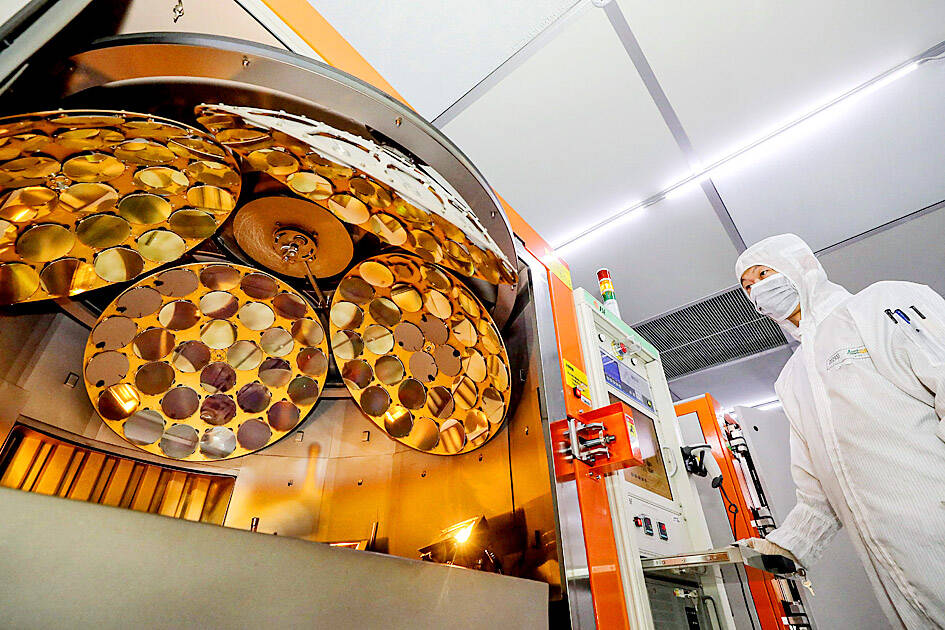China’s Yangtze Memory Technologies Co (長江存儲) has made progress in replacing foreign chipmaking technology with homegrown alternatives and its latest storage products now rival global market leaders, according to new research from TechInsights Inc.
The memory maker, one of a number of semiconductor companies subject to US trade sanctions designed to rein in China’s tech advances, is working with gear from Advanced Micro-Fabrication Equipment Inc (中微半導體), Naura Technology Group Co (北方華創) and Piotech Inc (拓荊科技), TechInsights analyst David Wei said in an interview. While the company still needs and relies on equipment from Dutch supplier ASML Holding NV and US-based Lam Research Corp, those domestic tools providers are taking up a larger share of the burden.
Trade tensions between Washington and Beijing have led to escalating export controls on advanced chips and chipmaking machinery to China, hitting companies like Yangtze Memory and Huawei Technologies Co (華為) at a time when semiconductors have grown into a strategically and economically critical sphere of business.

Photo: AFP
The Wuhan-based company recently upgraded its “Xtacking” tech, which stacks memory cells in layers, to a level where its NAND chip performance is on par with the best from industry leaders, TechInsights said in its latest research note. Demand for NAND storage has surged in recent months as the training of artificial intelligence models requires vast troves of data, and South Korea’s Samsung Electronics Co and SK Hynix Inc are the global leaders in the field.
Still, significant technical challenges remain for Yangtze Memory and its partners, which include Hwatsing Technology Co (華海清科), Wei said. The new chip made with Yangtze Memory’s Xtacking 4.0 technology actually has 70 fewer layers than the 232-layer chip made with its earlier-generation tech. This was because the latest fabrication method had a lower production yield due to the use of Chinese tools and Yangtze Memory was forced to downgrade the specification, TechInsights said.
Naura, Advanced Micro-Fabrication and Chinese peers like Piotech are all trying to improve their capabilities and catch up to US leaders like Applied Materials Inc and Lam. That effort is bolstered by having large-scale customers like Yangtze Memory, which in turn has provided memory to Shenzhen-based Huawei for its premium smartphone released in the spring, the Pura 70. At the same time, Shanghai Micro Electronics Equipment Group Co (上海微電子) is endeavoring to build advanced lithography machines like those made by ASML.
Yangtze Memory said in an email that the company is constantly improving its product performance, and the change in the layers of its latest chip is not connected with the yield rate of any particular equipment.
Currently, ASML is the only company in the world capable of making extreme ultraviolet (EUV) equipment, which is essential to produce the most cutting-edge chips.
China has yet to demonstrate an ability to manufacture advanced chips at scale without recourse to foreign-made equipment, and its lack of an EUV system could prove an insurmountable challenge. However, the country may celebrate advances like those by Yangtze Memory as evidence of progress in the nationwide push toward self-sufficiency.

MULTIFACETED: A task force has analyzed possible scenarios and created responses to assist domestic industries in dealing with US tariffs, the economics minister said The Executive Yuan is tomorrow to announce countermeasures to US President Donald Trump’s planned reciprocal tariffs, although the details of the plan would not be made public until Monday next week, Minister of Economic Affairs J.W. Kuo (郭智輝) said yesterday. The Cabinet established an economic and trade task force in November last year to deal with US trade and tariff related issues, Kuo told reporters outside the legislature in Taipei. The task force has been analyzing and evaluating all kinds of scenarios to identify suitable responses and determine how best to assist domestic industries in managing the effects of Trump’s tariffs, he

TIGHT-LIPPED: UMC said it had no merger plans at the moment, after Nikkei Asia reported that the firm and GlobalFoundries were considering restarting merger talks United Microelectronics Corp (UMC, 聯電), the world’s No. 4 contract chipmaker, yesterday launched a new US$5 billion 12-inch chip factory in Singapore as part of its latest effort to diversify its manufacturing footprint amid growing geopolitical risks. The new factory, adjacent to UMC’s existing Singapore fab in the Pasir Res Wafer Fab Park, is scheduled to enter volume production next year, utilizing mature 22-nanometer and 28-nanometer process technologies, UMC said in a statement. The company plans to invest US$5 billion during the first phase of the new fab, which would have an installed capacity of 30,000 12-inch wafers per month, it said. The

Taiwan’s official purchasing managers’ index (PMI) last month rose 0.2 percentage points to 54.2, in a second consecutive month of expansion, thanks to front-loading demand intended to avoid potential US tariff hikes, the Chung-Hua Institution for Economic Research (CIER, 中華經濟研究院) said yesterday. While short-term demand appeared robust, uncertainties rose due to US President Donald Trump’s unpredictable trade policy, CIER president Lien Hsien-ming (連賢明) told a news conference in Taipei. Taiwan’s economy this year would be characterized by high-level fluctuations and the volatility would be wilder than most expect, Lien said Demand for electronics, particularly semiconductors, continues to benefit from US technology giants’ effort

‘SWASTICAR’: Tesla CEO Elon Musk’s close association with Donald Trump has prompted opponents to brand him a ‘Nazi’ and resulted in a dramatic drop in sales Demonstrators descended on Tesla Inc dealerships across the US, and in Europe and Canada on Saturday to protest company chief Elon Musk, who has amassed extraordinary power as a top adviser to US President Donald Trump. Waving signs with messages such as “Musk is stealing our money” and “Reclaim our country,” the protests largely took place peacefully following fiery episodes of vandalism on Tesla vehicles, dealerships and other facilities in recent weeks that US officials have denounced as terrorism. Hundreds rallied on Saturday outside the Tesla dealership in Manhattan. Some blasted Musk, the world’s richest man, while others demanded the shuttering of his